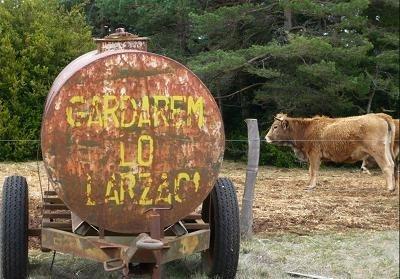Dir: Christian Rouaud. France 2011. 118 mins

The story of a modern French rural uprising, Leadersheep (Tous au Larzac!) is a documentary in the strict sense - it comprehensively and informatively reports its subject, rather than seducing us with any fancy storytelling techniques. The episode recounted is the story of an 11-year local protest against government plans to extend a military base, and offers both an exemplary power-to-the people narrative and a portent of the later ascent of the anti-globalisation movement.
The participants are lively and likeable, though not always charismatic enough to hold the camera at length.
It’s an involving story, but as told in the flat, talking-head-heavy style of Leadersheep, it comes across more as an earnest and over-stretched history lesson. Outside France, where the story was a national cause célèbre, theatrical potential will be scant, while TV exposure seems most likely in strictly pedagogic and political contexts (it might help, though, to choose a less facetious English-language title).
The location is Larzac, an agricultural region to the south of France’s Massif Central. The drama begins in 1971, when Michel Debré, then France’s Minister of Defense, announces his plan to expand a local military base - a move that would threaten the local sheep farming then undergoing a revival.
Local farmers, till then politically conservative, talk about how they came to stage their own 1968-style revolt as they contested Debré’s plans. The uprising begins on a small scale, with such stunts as taking sheep to Paris to raise the profile of their cause. Then the Larzac cause is espoused by a wide variety of leftists, hippies and alternative factions - including celebrity advocate of nonviolence Lanza del Vlasto, seen in archive footage as an eccentric guru figure. Major rallies follow in the region, which becomes a Mecca for French radicalism.
What starts off gently becomes an increasingly fraught concern, with the government digging its heels in and relations becoming increasingly sour between locals and the army. A stone thrown at visiting politician François Mitterand is thought to be the doing of an agent provocateur, and the story takes a particularly nasty turn when the home of a farmer and his family is bombed by parties unknown.
Several Larzac campaigners are jailed for stealing documents from an army base - one of the film’s key themes being the way that ordinary working people, who previously considered themselves non-political, risked all to defend their community and its livelihood.
This is certainly a stirring and troubling episode of solidarity against the system, and eventually one of triumph - although it appears that the campaign would apparently have been lost if a new Mitterand government had not been elected just in time to reverse the decisions of the Giscard regime. There’s some fascinating archive footage displayed here, but not enough to sustain the film’s two hours, which is overladen with Larzac veterans filmed telling what increasingly feels like a numbing chain of anecdotes.
The participants are lively and likeable, though not always charismatic enough to hold the camera at length. The one high-profile interviewee is farmer and activist José Bové, involved in the campaign, and subsequently the figurehead of the French anti-globalisation movement, which arguably had its roots in the Larzac struggle.
Production company: Elzevir Films
International sales: Ad Vitam, www.advitamdistribution.com
French distributor: MK2
Producers: Sandrine Brauer, Marie Masmonteil, Denis Carot
Cinematography: Alexis Kavyrchine
Editor: Fabrice Rouaud






![The Brightest SunScreen[Courtesy HKIFF]](https://d1nslcd7m2225b.cloudfront.net/Pictures/274x183/3/5/0/1448350_thebrightestsunscreencourtesyhkiff_312678.jpg)















